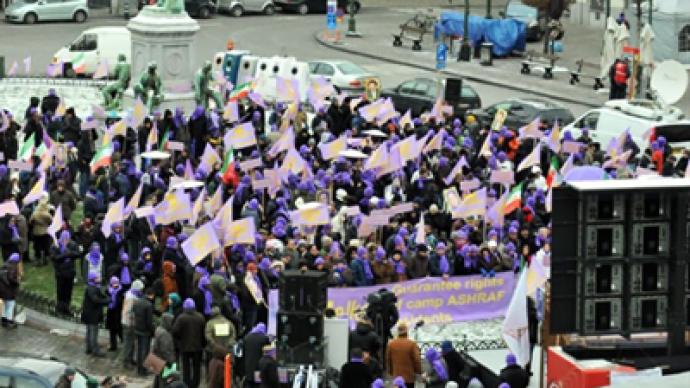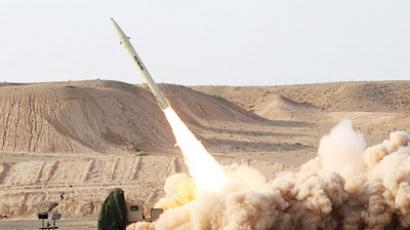Americans ignorant as Europeans protest US wars

While Americans struggle to answer how long the US has been in Iraq or Afghanistan, how much money has been spent, and how many lives lost, Europeans feeling the cost of US wars at home take to the streets in protest.
In the US, despite two combat missions costing thousands of lives, more than a trillion dollars, and nearly ten years, for many average Americans the realities of US wars aren't hitting home.“I’m trying to think Afghanistan, Iraq, I don’t know if it’s over or still going," said Rene Moreno when interviewed on the street in Times Square, a California resident visiting New York.The details, for instance, how long the US has been fighting in Afghanistan aren't known."Why you come and ask me a question like that," laughed New Yorker who identified herself simply as Karen, "I don't know."And the consequences aren't quantifiable. When asked how many US troops have been killed in Afghanistan, Lauralee Summerhill, a Californian living in New York tap danced around the question before admitting, "oh gosh, I just couldn't put my finger on it."The wars don’t rate high with Americans as the biggest problems facing the country."The Afghan war is kind of like a video game to a lot of people they feel unconnected," explained investigative reporter Bob Woodward, the author of “Obama's Wars”. "I think if we had the draft we would look at it very differently."According to pollsters the wars don’t rate with US media either, which has given Afghanistan just 3 percent of their attention for the first near half of the year, choosing instead to focus on other stories, such as actress Lindsay Lohan's drug rehab stints.Apparently in turn, so too have viewers.“Is Lindsay Lohan in rehab," RT asked New Yorker, Karen. "No she’s out of rehab." She answered without skipping a beat.Still polls show 62 percent of Americans are now against the war in Afghanistan. More prominent voices are rising up against the US military stance in the world.“We’re at the sundown as an imperialist power and we can’t have credit card imperialism, we can’t be the policeman of the world anymore because we can’t afford it, we’re going to have to cut defense dramatically," proclaimed David Stockman, former budget director for President Ronald Reagan, in an interview with ABC.This argument doesn’t appear to pass muster with lawmakers in Washington. But with hundreds of military bases spread over the world and more than half of the US discretionary budget spent on defense, amidst a sluggish economy and $13 trillion dollars of debt, increasingly critics see it coming at this price.“We have an empire," quipped comedian and satirist Bill Maher on his TV show "Real Time." "We have half a million of our troops in other people’s countries.”Discontent with US policies has spread overseas where in Portugal thousands of protesters took to the streets against US military bases, and against European defense spending on US wars.“We think that’s occupation for economical interests," one protester from Portugal said of the wars in Iraq and Afghanistan.Economic interests of one country, she said, supported by its NATO allies.“They also have interests or they support the world’s largest economy’s interests, and can’t be at the cost of human lives for some to get rich.”Thousands of European citizens who call NATO countries home hit the streets during the NATO summit to protest the costs incurred at their country’s expense. Some say the allies are fighting problems that are of the US's own making."The Taliban were the creation of the Mujahadeen, which itself was funded by the US during the Soviet occupation. What goes around comes around," said Jeremy Corbyn, a NATO protester and member of the British Parliament.Europeans facing austerity measures at home and losses on the battlefield don’t want to pay to solve American problems."Weneed the money that is spent on NATO budgets spent for solving the civil problems of the world," said protest organizer Reiner Braun, of Germany.But for now, very real costs of money and lives are being spent and being protested internationally in the name of US foreign policy, whether people know it or not.Adam Kokesh, a radio host and Iraq war veteranargued American foreign policy has nothing to do with keeping Americans safe, and Americans need to recognize that reality.He said the expansion of the US military abroad goes heavily unnoticed by most Americans. “There is bubble mentality in America, and I think it’s deliberate. The people who really run this country are more than happy to keep the American people not engaged politically, not really paying attention, not holding our elected officials accountable and not speaking out,” Kokesh said. Military spending is bankrupting the US. The government spends and expands based on personal financial greed; people take advantage of the system for their own profit, he argued. US military expansion through “greed” in the military industrial complex does not make America any safer, it enriches individuals.
David Vine, a professor at American University in Washington, DC and author of “Island of Shame: The Secret History of the US Military Base on Diego Garcia” said most Americans are oblivious to the size and extend of the US military abroad, both in war zones and on permanent bases. The United States has over 1000 military bases or sites outside of the US.“Many of the bases are the products of World War two and have been there for over 60 years. Other paces in places like South Korea have been there for half a century. Few people question their existence, let alone the costs they are inflicting on US taxpayers or the costs they are inflicting on those who have to live next door,” said Vine. Many people in the US see no connection between the many bases and the Iraq and Afghanistan wars with the security of US, he argued. That is why more and more continue to oppose the wars. However, many in the US are still unaware of the reality of these bases and wars. “So many people in the United States are so distant, so removed from the realities of the war,” Vine added.














